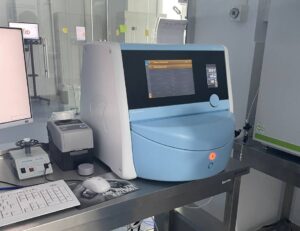Introduction to Surrogacy in Georgia
A single glance at annual numbers is enough to understand why surrogacy became such a big deal in the last few decades. Think about it – almost seven million people or every eighth couple are affected by infertility every year in the US alone.
This, however, doesn’t mean the dreams of parenthood are automatically over for future families. Surrogacy programs, like the ones offered by the SILK Medical clinic in Tbilisi, Georgia, are a safe, reliable and affordable way to become parents despite any health-related issues.

In a nutshell, surrogacy is the process where a woman carries and delivers a child for another person or couple. There are of course a lot of nuances involved, and all of them will be covered here.
What’s undeniable is that surrogacy in Georgia is one of the most accessible options for US and other international couples looking for affordable assisted reproductive treatments.
Georgia, not to be confused with the US state of Georgia, is a small but culturally rich country located at the crossroads of Europe and Asia. In recent years it has gained prominence as a preferred destination for surrogacy.
Understanding why requires an overview of Georgian legal framework, treatment success rates, available healthcare facilities, technologies applied, cost-effectiveness, and overall surrogacy process.
Table of Contents
Legal Framework of Surrogacy in Georgia
One of the most appealing aspects of surrogacy in Georgia is its clear and supportive legal framework. Unlike many countries where surrogacy laws are either restrictive or ambiguous, Georgia has a legally secure environment for both intended parents and surrogate mothers. Here, all the processes are legally regulated under the Civil Code, which stipulates that the biological parents are recognized as the legal guardians from the moment of conception.
At SILK Medical, all the administrative preparation is conducted during the first stage of any chosen surrogacy program, outlining the rights and relationship between the parents and the surrogate mother.

Key Points about Georgian Surrogacy Laws
- Georgian laws on commercial and altruistic surrogacy have been in place since 1997, with further amendments introduced in 2016.
- Despite plans to overhaul the current legislation, as of June 2024, no changes have been instigated.
IVF and Surrogacy Regulations (Articles 143 and 144 of the Georgian Law)
- IVF is permitted for treating infertility or when there's a risk of passing on a genetic disease from either spouse.
- The process may involve using the couple's own reproductive cells or those from a donor, but it requires the couple's written consent.
- IVF can be used to implant an embryo into a surrogate mother, with the written consent of the couple.
The law recognizes the intended couple as the parents of any child born through this method, meaning neither a donor nor the surrogate mother has parental rights over the child.
- Reproductive cells or embryos can be frozen for future use, with the duration of storage decided by the couple according to established guidelines.
One of the few legal stipulations for surrogacy in Georgia is for intended parents to be legally married or in a provable domestic partnership for at least one year. Otherwise, the legal processes accompanying surrogacy are mostly straightforward.
Despite this, SILK Medical clinic offers an in-house legal team to fully cover and explain all legal details to the couples entering its surrogacy programs.
Rights of the Surrogate Mother
Rights of Intended Parents
In Georgia, surrogate mothers are protected by law, ensuring they receive proper medical care, as well as fair compensation as per the signed contract with the clinic and intended parents. The law clearly states that the surrogate mother has no parental rights over the child, which helps to prevent potential legal conflicts after the birth.
After the signing of the agreement between the intended parents and SILK Medical, as well as the surrogate mother, the clinic provides all the necessary medical care and logistical support to the latter. The second and third steps in SILK Medical surrogacy programs include transportation expenses, lodging, childbirth assistance (natural or cesarean) and post-pregnancy hospital stay. All this ensures the surrogate mother and the baby are always in good hands and have the best conditions through the entire process.
Intended parents, whether domestic or international, are guaranteed full parental rights from the moment of signing the surrogacy agreement. This legally binding contract makes Georgia an attractive option for surrogacy, as it minimizes the risk of legal battles and leads to a smooth transition of parental rights.
As a rule, it takes just a few days for the intended parents to obtain an official birth certificate, and no longer than a couple of weeks in some rare cases.
The document itself is a regular birth certificate, no different than the ones received after regular childbirth. To receive it, the parents must provide the initial surrogacy agreement, the certificate of embryo transfer to the surrogate mother, and the certificate from the maternity hospital.
International Surrogacy Agreements
Georgia’s surrogacy laws also accommodate US and other international intended parents, providing a legal framework that supports cross-border surrogacy agreements. This international friendliness has contributed significantly to Georgia’s reputation as a reliable destination for surrogacy and booming fertility tourism.

Once the parents have the birth certificate on their hands all they need to do is to apply to the embassy of their country and either receive the baby’s passport or temporary travel documents. After that the parents are free to leave the country with their newborn at any time convenient for them.
Most of the time the stage of obtaining documents and their finalization is quite straightforward and efficient, and many couples choose to go through the process on their own. However, SILK Medical has lawyers on staff to help the parents in case any legal assistance is required.
The Process of Surrogacy in Georgia
Despite the fact that surrogacy programs in Georgia are quite affordable (as compared to other countries), they still involve a lot of meticulous planning and precise execution by fertility experts like the ones at SILK Medical. This is why intended parents should be fully aware of all stages involved in the surrogacy process.

Initial Consultation and Matching
The first step is an initial consultation with the fertility clinic specialists. During this stage, intended parents discuss their needs and preferences, while the clinic matches them with the most appropriate surrogate program. SILK Medical offers several options depending on individual needs, requirements and budgets of each couple.
In some cases, a straightforward Basic Surrogacy plan may be enough. In others, factors like age, prior IVF attempts, birth complications, hereditary issues, or simple preference to have more control and the increased success probability may lead to more advanced programs. For instance, the Guaranteed Surrogacy plan involves preimplantation genetic diagnostic/screenings, intracytoplasmic sperm injection, unlimited egg transfers and additional options.
Once a plan is settled on, the intended parents are presented with the clinic’s catalog to browse the potential candidates for a surrogate mother. This way they can find the best possible match based on medical and psychological evaluations, as well as the surrogate’s looks, background, occupation, and even the astrological sign.
Medical Screening
Both the surrogate and the intended parents undergo thorough medical evaluation to confirm they are in the best condition for the surrogacy process. This includes any necessary fertility treatments for the intended parents and health checks for the surrogate mother.
All surrogacy candidates undergo health evaluation before the inclusion in SILK Medical database. Intended parents can choose from the available pool, followed by the approval of the programs’ lead reproductive physician. The clinic’s requirements to become a surrogate include:
- Age between 20 and 30
- At least one previous healthy pregnancy and delivery
- Good physical and mental condition, confirmed by an in-house medical examination
- Absence of bad habits, including tobacco, alcohol or drug use
- No history of significant complications during previous pregnancies
In case donor eggs are required for the program, the intended parents can access SILK Medical’s database of available donors, who also undergo all the necessary health evaluations prior to entering the program.
Preparations, Genetic Testing and Laboratory Stage

At this point, depending on the chosen plan, the couple may opt for sperm cryopreservation, while the egg donor (if this is part of the program) receives the required medication, followed by induction of ovarian superovulation. This is followed by transvaginal egg retrieval, embryos fertilization and cultivation, intracytoplasmic sperm injection and blastocyst cultivation.
By selecting the most viable embryos, PGT improves the likelihood of a successful IVF, increasing pregnancy probability up to 70%. If so desired, this is also the stage where the intended parents have the chance to select the sex of their baby by selecting the appropriate embryos.
After that the embryos are vitrified (frozen) until the end of the program, while the surrogate mother’s endometrium is prepared for the transfer.
Embryo Transfer and Pregnancy
Once the surrogate mother is ready, the embryo transfer is conducted under precision conditions to improve success rates. Following the procedure, pregnancy is monitored through HCG blood tests to confirm embryo implantation. Regular ultrasounds track the fetus’s development and the surrogate’s health, checking that the pregnancy progresses appropriately.
All the logistics are usually taken care of during this stage, including monthly compensations after the confirmation of a heartbeat, as well as surrogate mother’s transportation and lodging. As the delivery approaches, the clinic will plan the birth according to the intended parents’ preferences, aligning with Georgian law and medical protocols.
Birth and Legal Procedures
The birth process can take the form of a natural delivery or a Cesarean section. Optionally, the intended parents may choose to be present during the baby’s arrival. Following the child birth, the surrogate mother stays in a standard room at a private hospital for 3 to 5 days, focusing on her comfort and recovery under medical supervision.
Post-delivery, SILK Medical provides full support for the legalization of documents related to the newborn. This includes translation services, notary authentication, and the assistance of a lawyer to handle the necessary legalities efficiently. These services help to correctly process all paperwork, establishing the intended parents as the legal parents of the child, and prepare the family for the return to their home country.
Medical Facilities for Surrogacy in Georgia

Georgia, with its rich history and quickly developing modern healthcare sector, stands out as one of the top destinations for surrogacy, attracting intended parents from across the globe. Central to Georgia’s appeal are its high-quality medical facilities and specialized IVF clinics like SILK Medical, which is equipped to provide world-class advanced care throughout the surrogacy process.
SILK Medical is not only technologically advanced, having equipment available to only 10% of fertility clinics worldwide, but is also staffed by an experienced international medical team. These include experts in reproductology, embryology and gynecology, many of whom are published authors and trade conference speakers.
Quality of Medical Services
- Georgia has very high standards of provided medical services, all in line with international expectations and global best practices.
- Local facilities are known for strictly following safety protocols, so that all medical procedures are performed with utmost precision and care.
- From initial fertility treatments to prenatal care and delivery, all stages of surrogacy programs prioritize patient safety and success. This is attested by the high success rates of local IVF and surrogacy treatments as compared to other countries.
- Personalized treatment plans designed to suit specific needs of each patient.
- Regular pregnancy monitoring and check-ups
- Continuous support from a dedicated medical team
The healthcare standards in Georgia are governed by regulations and protocols in line with international guidelines. The Georgian Ministry of Health oversees the licensing and policies of medical facilities, which confirms that clinics like SILK Medical meet the required grade of care. This includes regular inspections and audits to maintain high levels of hygiene, safety, and patient treatment.
Advanced Reproductive Technologies and Equipment
As compared to many international surrogacy destinations like Mexico and Spain, Georgia stands out as a country with very advanced reproductive technology. The range of advanced treatments and procedures offered by clinics like SILK Medical allow to consistently display high success rates when it comes to surrogacy.
- Preimplantation genetic testing (PGT) to screen embryos for genetic conditions
- Intracytoplasmic sperm injection (ICSI) for cases of male infertility
- Cryopreservation techniques for freezing eggs, sperm, and embryos
SILK Medical's Unique Equipment
AI-powered EmbryoScope: A special incubator with a high-resolution camera and AI-based software to monitor and analyze embryo development, increasing the chances of successful development.

IVFID Witness: A special security system using Radio Frequency Identification (RFID) chips to wirelessly verify and match sperm and egg samples during all treatment stages, eliminating human errors.

Accessibility and Convenience
The accessibility and convenience of medical services in Georgia further enhance its attractiveness as a surrogacy destination. For instance, SILK Medical clinic offers streamlined processes for international patients, including assistance with travel arrangements, accommodation, and legal documentation.
The availability of multilingual staff and patient coordinators helps to eliminate language barriers, leading to clear communication and understanding throughout the treatment process. This level of support and convenience is particularly beneficial for international intended parents who often go through the surrogacy process in a foreign country for the first time.
Cost of Surrogacy in Georgia

One of the most compelling reasons intended parents choose Georgia for surrogacy is its cost-effectiveness. Compared to many Western countries, such as the United States, Canada, and the United Kingdom, surrogacy in Georgia is significantly more affordable, without compromising on the quality of medical care, legal security, or the well-being of the surrogate and intended parents.
This financial advantage is a major factor driving the popularity of Georgia as a surrogacy destination, making it an attractive option for international couples who may not have the financial means to pursue surrogacy in their home countries.
Factors Contributing to Lower Costs
- Lower overall cost of living in Georgia
- The overall cost of living in Georgia is lower than in many Western countries, which translates to lower expenses for medical procedures, legal services, and surrogate compensation.
- Well-developed and efficient Georgian healthcare system
- This allows for high-quality medical care to be provided at a more affordable price point compared to countries with higher healthcare costs.
- Streamlined legal process with clear and supportive legal framework
- This reduces the need for extensive legal representation and associated costs, further bringing down the overall expense of the surrogacy process.
Breakdown of Costs
The total cost of surrogacy in Georgia includes several key components, each contributing to the overall expense. On average, the cost ranges from $40,000 to $70,000, which is considerably lower than the cost in countries like the United States or Canada, where surrogacy can easily exceed $250,000. Here is a detailed breakdown of the typical expenses involved:
- Medical Expenses
- This includes all medical procedures related to IVF, including initial fertility treatments, embryo transfer, prenatal care, and delivery. The costs also cover routine health check-ups, ultrasounds, and any necessary medical interventions during the pregnancy. In Georgia, these medical expenses are generally lower than in Western countries due to the efficiency of the healthcare system and the lower overall cost of medical services.
- Legal Fees
- Legal expenses cover the drafting and execution of surrogacy agreements, establishment of parental rights, and any additional legal documentation required for the process. This guarantees that all parties involved are protected and that the intended parents are recognized as the legal parents of the child from the moment of birth. In Georgia, the legal process for surrogacy is well-defined and efficient, which helps to minimize legal fees compared to countries with more complex or ambiguous surrogacy laws.
- Surrogate Compensation
- Surrogate mothers in Georgia receive fair compensation for their commitment and the physical and emotional demands of carrying a pregnancy. This compensation includes monthly stipends during the pregnancy, which cover the surrogate's living expenses and any additional costs related to the pregnancy, such as maternity clothing and nutritional supplements.
After the birth of the child, surrogates also receive a final lump sum payment as a token of appreciation for their role in helping the intended parents build their family. While the compensation for surrogate mothers in Georgia is fair and adequate, it is often lower than in countries like the United States, where surrogate compensation can be significantly higher.
- Miscellaneous Costs
- Additional costs associated with surrogacy in Georgia may include travel and accommodation expenses for intended parents who need to visit the country for key milestones such as the embryo transfer or the birth of the child.
Insurance for the surrogate mother, covering any medical complications or emergencies that may arise during the pregnancy, is another potential expense.
While these miscellaneous costs can add to the overall expense of surrogacy, they are often more manageable in Georgia compared to other countries due to the lower cost of travel, accommodation, and insurance in the region.
Eligibility Criteria for Surrogacy in Georgia
To secure the safety and success of the surrogacy process, Georgia has established clear eligibility criteria for both surrogate mothers and intended parents. These criteria are designed to protect the well-being of all parties involved and to verify that surrogacy is carried out in a responsible and ethical manner.

Requirements for Surrogate Mothers
Surrogate mothers in Georgia must meet specific health and age criteria to be eligible for the surrogacy process. They are typically required to be between the ages of 20 and 35, as this age range is considered optimal for a healthy pregnancy and minimizes the risk of age-related complications.
Additionally, prospective surrogates must have had at least one healthy pregnancy and successful birth in the past. This requirement demonstrates that the woman’s body is capable of carrying a pregnancy to term.
To further guarantee the suitability of surrogate mothers, they must undergo full medical evaluation. This includes a thorough review of the surrogate’s health history, as well as physical examinations and laboratory tests to screen for any potential health issues that could impact the pregnancy. Among them are tests for infectious diseases, such as HIV and hepatitis, as well as assessments of the surrogate’s reproductive health, including her uterine cavity and ovarian reserve.
Requirements for Intended Parents
Intended parents who apply for surrogacy in Georgia must also meet certain eligibility criteria. One of the primary requirements is that they provide proof of their inability to conceive naturally. This is typically demonstrated through medical documentation, such as a physician’s letter outlining the specific medical conditions or infertility issues that prevent the intended parents from achieving a successful pregnancy on their own.

In many cases, intended parents have already undergone various fertility treatments, such as IVF, without success before turning to surrogacy as an alternative.
The medical documentation they provide serves as evidence of their infertility and supports their eligibility for surrogacy under Georgian law.
Another key requirement for intended parents in Georgia is that they must be legally married or in a cohabiting relationship for at least one year. This stipulation is in place to certify that the child born through surrogacy will have the legal and social support of two committed parents.
The requirement also helps to establish clear parental rights and responsibilities, as both members of the couple will be recognized as the child’s legal parents from the moment of birth.
Legal Restrictions and Conditions
Georgia’s laws currently prohibit surrogacy arrangements for same-sex couples and single individuals.
These restrictions are in place to ensure the best interests of the child and to comply with the country’s cultural and legal norms. Georgia, like many other countries, places a strong emphasis on the traditional family structure and believes that a child’s well-being is best served by having both a mother and a father.
It is worth noting that as social attitudes and legal landscapes evolve, there is the possibility that these restrictions may change in the future. Some advocates are working to promote more inclusive surrogacy laws that would allow same-sex couples and single individuals to access surrogacy services in Georgia.
Advantages of Surrogacy in Georgia

Surrogacy in Georgia offers numerous advantages, making it an appealing option for intended parents worldwide. From the supportive legal framework to the affordability and high success rates, Georgia has established itself as a leading destination for international surrogacy.
- Legal Protection and Clarity
- One of the most significant advantages of pursuing surrogacy in Georgia is the legal clarity and protection offered by the country's surrogacy laws. Unlike some other countries where surrogacy laws may be ambiguous or even hostile towards intended parents, Georgia's legal system is designed to support and facilitate the surrogacy process.
- Affordability and Cost-effectiveness
- Another significant advantage is surrogacy affordability and cost-effectiveness compared to other popular surrogacy destinations. The overall costs of surrogacy in Georgia are significantly lower than in countries like the United States, Canada, or the United Kingdom, making it a more accessible option for intended parents with limited financial resources.
Notably, the affordability of surrogacy in Georgia does not come at the expense of quality. The country has a well-developed healthcare infrastructure, with modern medical facilities and highly skilled healthcare professionals.
Moreover, the lower costs of surrogacy in Georgia allow intended parents to allocate their resources more effectively, potentially letting them pursue additional fertility treatments or support services that may enhance their chances of success.
- High Success Rates
- In addition to its legal and financial advantages, surrogacy in Georgia is also known for its high success rates. Clinics like SILK Medical employ advanced medical technologies, experienced healthcare professionals, and strict screening processes, all contributing to a higher likelihood of a successful pregnancy and a healthy birth.
SILK Medical uses only state-of-the-art equipment and techniques in its fertility treatments and prenatal care. This includes IVF technologies such as intracytoplasmic sperm injection (ICSI) and preimplantation genetic testing (PGT), which can help to optimize the chances of a successful embryo transfer and implantation.
The healthcare professionals involved in the surrogacy process, including fertility experts, obstetricians, and embryologists, are highly trained and experienced in their respective fields.
- Favorable Conditions for International Couples
- Georgia's surrogacy environment is particularly favorable for international couples seeking surrogacy services abroad. The country's legal framework, healthcare infrastructure, and welcoming conditions make it an ideal destination for intended parents from around the world.
In addition clinics like SILK Medical have experience working with intended parents from diverse cultural backgrounds and offer a range of support services for best surrogacy outcomes. These services may include assistance with travel arrangements, accommodation, and translation services, as well as ongoing medical support and guidance throughout the process.
Moreover, Georgia is known for its warm hospitality and welcoming attitude towards international visitors. The country's friendly and supportive environment can help to ease the stress and emotional challenges that often accompany the surrogacy process, particularly for couples who are far from home.

